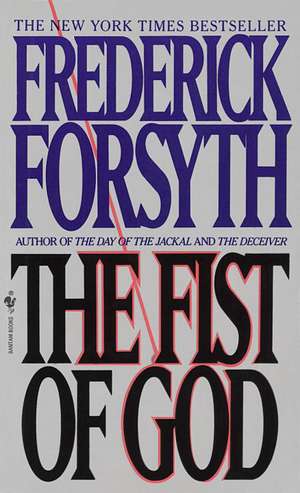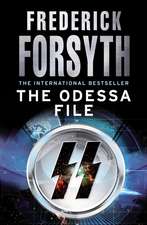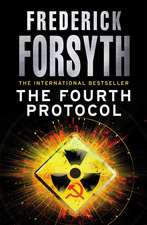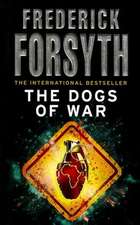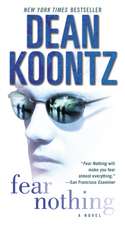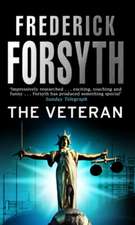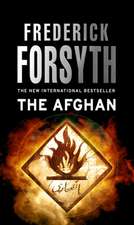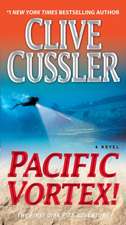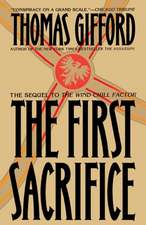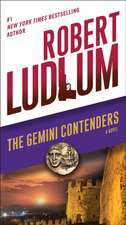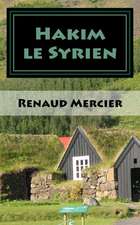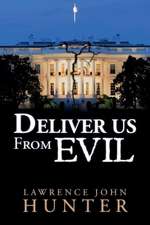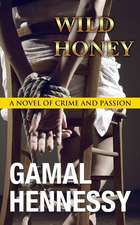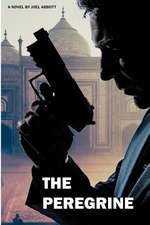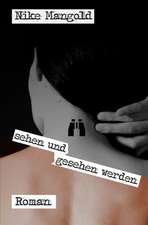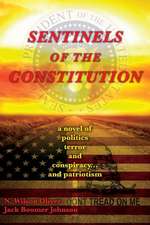The Fist of God
Autor Frederick Forsythen Limba Engleză Paperback – 30 iun 1995
From the behind-the-scenes decision-making of the Allies to the secret meetings of Saddam Hussein's war cabinet, from the brave American fliers running their dangerous missions over Iraq to the heroic young spy planted deep in the heart of Baghdad, Forsyth's incomparable storytelling skill keeps the suspense at a breakneck pace. Somewhere in Baghdad is the mysterious "Jericho," the traitor who is willing--for a price--to reveal what is going on in the high councils of the Iraqi dictator. But Saddam's ultimate weapon has been kept secret even from his most trusted advisers, and the nightmare scenario that haunts General Schwarzkopf and his colleagues is suddenly imminent, unless somehow, the spy can locate that weapon--The Fist of God--in time.
Peopled with vivid characters, brilliantly displaying Forsyth's incomparable, knowledge of intelligence operations and tradecraft, moving back and forth
between Washington and London, Baghdad and Kuwait, desert vastnesses and city bazaars, this breathtaking novel is an utterly convincing story of what may
actually have happened behind the headlines.
| Toate formatele și edițiile | Preț | Express |
|---|---|---|
| Paperback (2) | 51.94 lei 3-5 săpt. | +11.41 lei 4-10 zile |
| Bantam – 30 iun 1995 | 51.94 lei 3-5 săpt. | +11.41 lei 4-10 zile |
| TRANSWORLD PUBL – 30 sep 1996 | 579.87 lei 3-5 săpt. | +1867.91 lei 4-10 zile |
Preț: 51.94 lei
Nou
Puncte Express: 78
Preț estimativ în valută:
9.94€ • 10.34$ • 8.21£
9.94€ • 10.34$ • 8.21£
Carte disponibilă
Livrare economică 24 martie-07 aprilie
Livrare express 07-13 martie pentru 21.40 lei
Preluare comenzi: 021 569.72.76
Specificații
ISBN-13: 9780553572421
ISBN-10: 0553572423
Pagini: 592
Dimensiuni: 106 x 174 x 34 mm
Greutate: 0.28 kg
Editura: Bantam
ISBN-10: 0553572423
Pagini: 592
Dimensiuni: 106 x 174 x 34 mm
Greutate: 0.28 kg
Editura: Bantam
Extras
The staff indulged him, that Helene was just a good friend, keeping him company while he was in Brussels and his wife was in Canada.
He climbed out of the car, the collar of his belted trench coat turned up as ever, and hefted onto his shoulder the big black canvas bag that hardly ever left him. It weighed over fifteen kilograms and contained a mass of papers: scientific papers, projects, calculations, and data. The scientist distrusted safes and thought illogically that all the details of his latest projects were safer hanging from his shoulder.
The last Monique saw of her employer, he was standing in front of the glass doors, his bag over one shoulder, the loaf under the other arm, fumbling for his keys. She watched him go through the doors and the self-locking plate glass swing closed behind him. Then she drove off.
The scientist lived on the sixth floor of the eight-story building. Two elevators ran up the back wall of the building, encircled by the stairs, with a fire door on each landing. He took one of them and stepped out at the sixth floor. The dim, floor-level lights of the lobby came on automatically as he did so. Still jangling his keys, leaning against the weight of his bag, and clutching his loaf, he turned left and left again across the russet-brown carpet and tried to fit his key into the lock of his apartment door.
The killer had been waiting on the other side of the elevator shaft, which jutted into the dimly lit lobby. He came quietly around the shaft holding his silenced 7.65-mm. Beretta automatic, which was wrapped in a plastic bag to prevent the ejected cartridges from spilling all over the carpet.
Five shots, fired from less than a one-meter range into the back of the head and neck, were more than enough. The big, burly man slumped forward against his door and slithered to the carpet. The gunman did not bother to check; there was no need. He had done this before, practicing on prisoners, and he knew his work was done. He ran lightly down the six flights of stairs, out of the back of the building, across the tree-studded gardens, and into the waiting car. In an hour he was inside his country's embassy, in a day out of Belgium.
He climbed out of the car, the collar of his belted trench coat turned up as ever, and hefted onto his shoulder the big black canvas bag that hardly ever left him. It weighed over fifteen kilograms and contained a mass of papers: scientific papers, projects, calculations, and data. The scientist distrusted safes and thought illogically that all the details of his latest projects were safer hanging from his shoulder.
The last Monique saw of her employer, he was standing in front of the glass doors, his bag over one shoulder, the loaf under the other arm, fumbling for his keys. She watched him go through the doors and the self-locking plate glass swing closed behind him. Then she drove off.
The scientist lived on the sixth floor of the eight-story building. Two elevators ran up the back wall of the building, encircled by the stairs, with a fire door on each landing. He took one of them and stepped out at the sixth floor. The dim, floor-level lights of the lobby came on automatically as he did so. Still jangling his keys, leaning against the weight of his bag, and clutching his loaf, he turned left and left again across the russet-brown carpet and tried to fit his key into the lock of his apartment door.
The killer had been waiting on the other side of the elevator shaft, which jutted into the dimly lit lobby. He came quietly around the shaft holding his silenced 7.65-mm. Beretta automatic, which was wrapped in a plastic bag to prevent the ejected cartridges from spilling all over the carpet.
Five shots, fired from less than a one-meter range into the back of the head and neck, were more than enough. The big, burly man slumped forward against his door and slithered to the carpet. The gunman did not bother to check; there was no need. He had done this before, practicing on prisoners, and he knew his work was done. He ran lightly down the six flights of stairs, out of the back of the building, across the tree-studded gardens, and into the waiting car. In an hour he was inside his country's embassy, in a day out of Belgium.
Recenzii
"Frederick Forsyth combines fact and fiction in The Fist of God...but [he] never forgets that he is writing a novel...Excitement without hysteria and plenty of credible action."
--The New York Times Book Review
"[An] incredible, imaginative mind...master of international intrigue."
--Larry King
--The New York Times Book Review
"[An] incredible, imaginative mind...master of international intrigue."
--Larry King
Descriere
The author of such classics as The Day of the Jackal returns with a seamless blending of the real and the imagined, of political assassination and high-tech military might, set behind the scenes of the Gulf War. As coalition forces ready for battle against the Iraqi Army, a Western spy in Baghdad seeks a mysterious traitor named Jericho, who may hold the key to locating Saddam Hussein's secret weapon.
Notă biografică
Frederick Forsythis a bestselling author known for the thrillers The Day of the Jackal, The Odessa File, and The Kill List. A former reporter for Reuters and the BBC, he won the Diamond Dagger Award from the Crime Writers’ Association in 2012 for a career of sustained excellence. Forsyth lives in England.
